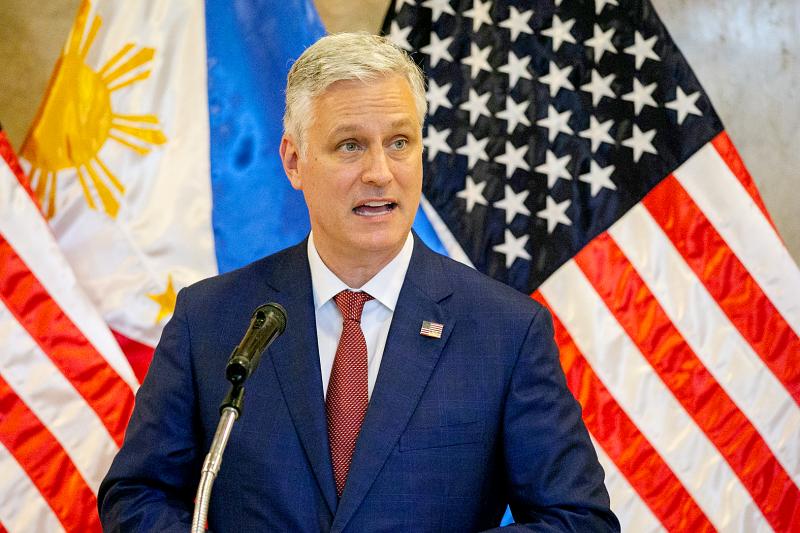US President Donald Trump’s administration on Tuesday declassified a report that casts the defense of Taiwan as critical to the Indo-Pacific strategy of checking China’s ascent, Bloomberg reported yesterday.
“US Strategic Framework for the Indo-Pacific” has governed the US’ strategic response to China since Trump approved it in February 2018, Bloomberg reported, citing a statement by US National Security Adviser Robert O’Brien.
“Beijing is increasingly pressuring Indo-Pacific nations to subordinate their freedom and sovereignty to a ‘common destiny’ envisioned by the Chinese Communist Party [CCP],” O’Brien was cited as saying.

Photo: Reuters
The report assumes that China would “take increasingly assertive steps to compel unification with Taiwan,” Bloomberg quoted the document as saying.
China’s presumptive aim is to “dissolve US alliances and partnerships in the region” before moving to “exploit vacuums and opportunities created by these diminished bonds,” the report says.
It advises the US to devise and implement a defense strategy that is capable of denying China sustained air and sea dominance inside the first island chain in a war, and defending Taiwan and other first nations on the island chain.
Part of that defense strategy would be to enable “Taiwan to develop an asymmetric defense strategy and capabilities” that would allow the nation to “engage China on its own terms,” the report says.
The report highlights China’s “predatory economic practices” that “freeze out” foreign competition, undermining US competitiveness and furthering the CCP’s ambitions to “dominate the 21st-century economy.”
Beijing is also expected to seek dominion over “cutting-edge technologies, including artificial intelligence and bio-genetics, and to harness them in the service of authoritarianism,” the report says.
The US should contend with China’s economic practices by building an international consensus that Beijing’s industrial and unfair trade politics are detrimental to the global trading system, it says.
Chinese Ministry of Foreign Affairs spokesman Zhao Lijian (趙立堅) yesterday said that the strategic framework for the Indo-Pacific contradicts the “solemn promises of the US” regarding its policy toward Taiwan.
“The US should turn away from an erroneous and dangerous path that could jeopardize peace and stability in the Taiwan Strait, and harm China-US relations,” he said.
Zhao made the remarks at a routine news conference and reiterated Beijing’s “one China” principle that “Taiwan is an inseparable sovereign territory of China.”
“The content of the documents betrays the vile intentions of the US Indo-Pacific strategy to suppress China and to damage regional peace and stability,” he said, calling the document “a strategy to maintain hegemony.”
“China has the determination, confidence and ability to defeat external forces’ attempts at interference or Taiwanese independence conspiracies,” he said.
“Any ploy to check China with Taiwan is futile,” Zhao added.
The document’s allegations that China is ratcheting up the pressure on neighboring countries are “malicious distortions and lies,” he said.

NATIONAL SECURITY THREAT: An official said that Guan Guan’s comments had gone beyond the threshold of free speech, as she advocated for the destruction of the ROC China-born media influencer Guan Guan’s (關關) residency permit has been revoked for repeatedly posting pro-China content that threatens national security, the National Immigration Agency said yesterday. Guan Guan has said many controversial things in her videos posted to Douyin (抖音), including “the red flag will soon be painted all over Taiwan” and “Taiwan is an inseparable part of China,” while expressing hope for expedited “reunification.” The agency received multiple reports alleging that Guan Guan had advocated for armed reunification last year. After investigating, the agency last month issued a notice requiring her to appear and account for her actions. Guan Guan appeared as required,

Japan and the Philippines yesterday signed a defense pact that would allow the tax-free provision of ammunition, fuel, food and other necessities when their forces stage joint training to boost deterrence against China’s growing aggression in the region and to bolster their preparation for natural disasters. Japan has faced increasing political, trade and security tensions with China, which was angered by Japanese Prime Minister Sanae Takaichi’s remark that a Chinese attack on Taiwan would be a survival-threatening situation for Japan, triggering a military response. Japan and the Philippines have also had separate territorial conflicts with Beijing in the East and South China

A strong cold air mass is expected to arrive tonight, bringing a change in weather and a drop in temperature, the Central Weather Administration (CWA) said. The coldest time would be early on Thursday morning, with temperatures in some areas dipping as low as 8°C, it said. Daytime highs yesterday were 22°C to 24°C in northern and eastern Taiwan, and about 25°C to 28°C in the central and southern regions, it said. However, nighttime lows would dip to about 15°C to 16°C in central and northern Taiwan as well as the northeast, and 17°C to 19°C elsewhere, it said. Tropical Storm Nokaen, currently

PAPERS, PLEASE: The gang exploited the high value of the passports, selling them at inflated prices to Chinese buyers, who would treat them as ‘invisibility cloaks’ The Yilan District Court has handed four members of a syndicate prison terms ranging from one year and two months to two years and two months for their involvement in a scheme to purchase Taiwanese passports and resell them abroad at a massive markup. A Chinese human smuggling syndicate purchased Taiwanese passports through local criminal networks, exploiting the passports’ visa-free travel privileges to turn a profit of more than 20 times the original price, the court said. Such criminal organizations enable people to impersonate Taiwanese when entering and exiting Taiwan and other countries, undermining social order and the credibility of the nation’s